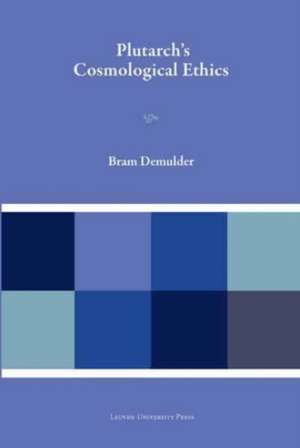Demulder, B: Plutarch's Cosmological Ethics: Plutarchea Hypomnemata
Autor Bram Demulderen Limba Engleză Hardback – 4 iul 2022
Preț: 478.84 lei
Preț vechi: 621.87 lei
-23% Nou
Puncte Express: 718
Preț estimativ în valută:
91.65€ • 99.59$ • 77.04£
91.65€ • 99.59$ • 77.04£
Carte tipărită la comandă
Livrare economică 22 aprilie-06 mai
Preluare comenzi: 021 569.72.76
Specificații
ISBN-13: 9789462703292
ISBN-10: 9462703299
Pagini: 440
Dimensiuni: 163 x 237 x 29 mm
Greutate: 0.79 kg
Editura: Leuven University Press
Seria Plutarchea Hypomnemata
ISBN-10: 9462703299
Pagini: 440
Dimensiuni: 163 x 237 x 29 mm
Greutate: 0.79 kg
Editura: Leuven University Press
Seria Plutarchea Hypomnemata
Notă biografică
Bram Demulder is postdoctoral researcher at Leiden University and research associate at KU Leuven.
Cuprins
Acknowledgements
Abbreviations, titles, editions
Introduction
Chapter 1 Reading Plato
1. In search of irrational soul
2. Chaos and providence: flexible consistency and the Timaeus 2.1. Macro level: selection, arrangement, and function
2.2. Micro level: Plutarch¿s interpretation of Timaeus 53b
3. Moralising the cosmic soul: Plato¿s `development¿ and Laws 10
3.1. Invisible soul and soul as self-moved motion
3.2. Priority of soul
3.3. Maleficent soul
3.4. Consistency and `development¿
4. Cosmic cycles: literalness and the Statesman myth
4.1. Proclus on combining Timaeus and Statesman: introducing the problem
4.2. On the Generation of the Soul: facing the problem
4.3. Who or what is the cause for cosmic reversal?
4.4. In what period are we now?
4.5. What is Plutarch doing?
5. Concluding remarks
Chapter 2 Music
1. The demiurge and the musician
2. Music in heaven? The song of the Muses
3. Divine harmony on earth? The limits of inspiration
4. Concluding remarks
Chapter 3 Symposium
1. God and the symposiarch: Sympotic Questions 1.2 and 7.6
2. The cosmos and the symposium: Sympotic Questions 7.4 and 2.10
3. The ¿¿¿¿ and the venue: Sympotic Questions 5.5
4. Concluding remarks
Chapter 4 Politics
1. The Timaeus in the Phocion 2. The ruler and the demiurge in the historical works
3. The ruler and the sun: To an Uneducated Ruler 4. Concluding remarks
Chapter 5 On Tranquillity of Mind 1. ¿¿¿¿¿¿ (§ 1¿5): how to deal with ¿¿¿¿?
1.1. What is the problem?
1.2. How is the problem presented?
2. A shift in the ¿¿¿¿¿¿¿ (§ 14¿15): from internal to external synthesis
2.1. Beginning the ¿¿¿¿¿¿¿ (§ 6¿13): internal synthesis
2.2. Time and the self: memory (§ 14)
2.3. Becoming and the self: dualism (§ 15)
2.4. Looking back (§ 8) and continuing the ¿¿¿¿¿¿¿ (§ 16¿18): external synthesis
2.5. Interlude: time and becoming in Consolation to My Wife 3. `The cosmos is a temple¿ (§ 19¿20)
3.1. Intertextuality
3.2. Imagery
3.3. Contrasting images and intertexts? On Exile and Plutarch¿s `cosmopolitanism¿
3.4. Similar images and intertexts? ¿¿¿¿¿¿ and Second Sophistic cosmic festivals
4. Concluding remarks
Chapter 6 Dialogue on Love 1. The Platonist and the body
2. Eros and Aphrodite as cosmic gods (755e¿757a)
2.1. A doxography of cosmic love
2.2. Euripides¿ Hippolytus: a threat to the erotic cosmos
3. Eros, the sun, and the cave: rewriting Plato¿s Republic (764ä766b)
4. Interlude: reflecting the intelligible
5. Cosmic and human love (770äb)
6. Concluding remarks
Concluding remarks
Bibliography
Index locorum
General index
Abbreviations, titles, editions
Introduction
Chapter 1 Reading Plato
1. In search of irrational soul
2. Chaos and providence: flexible consistency and the Timaeus 2.1. Macro level: selection, arrangement, and function
2.2. Micro level: Plutarch¿s interpretation of Timaeus 53b
3. Moralising the cosmic soul: Plato¿s `development¿ and Laws 10
3.1. Invisible soul and soul as self-moved motion
3.2. Priority of soul
3.3. Maleficent soul
3.4. Consistency and `development¿
4. Cosmic cycles: literalness and the Statesman myth
4.1. Proclus on combining Timaeus and Statesman: introducing the problem
4.2. On the Generation of the Soul: facing the problem
4.3. Who or what is the cause for cosmic reversal?
4.4. In what period are we now?
4.5. What is Plutarch doing?
5. Concluding remarks
Chapter 2 Music
1. The demiurge and the musician
2. Music in heaven? The song of the Muses
3. Divine harmony on earth? The limits of inspiration
4. Concluding remarks
Chapter 3 Symposium
1. God and the symposiarch: Sympotic Questions 1.2 and 7.6
2. The cosmos and the symposium: Sympotic Questions 7.4 and 2.10
3. The ¿¿¿¿ and the venue: Sympotic Questions 5.5
4. Concluding remarks
Chapter 4 Politics
1. The Timaeus in the Phocion 2. The ruler and the demiurge in the historical works
3. The ruler and the sun: To an Uneducated Ruler 4. Concluding remarks
Chapter 5 On Tranquillity of Mind 1. ¿¿¿¿¿¿ (§ 1¿5): how to deal with ¿¿¿¿?
1.1. What is the problem?
1.2. How is the problem presented?
2. A shift in the ¿¿¿¿¿¿¿ (§ 14¿15): from internal to external synthesis
2.1. Beginning the ¿¿¿¿¿¿¿ (§ 6¿13): internal synthesis
2.2. Time and the self: memory (§ 14)
2.3. Becoming and the self: dualism (§ 15)
2.4. Looking back (§ 8) and continuing the ¿¿¿¿¿¿¿ (§ 16¿18): external synthesis
2.5. Interlude: time and becoming in Consolation to My Wife 3. `The cosmos is a temple¿ (§ 19¿20)
3.1. Intertextuality
3.2. Imagery
3.3. Contrasting images and intertexts? On Exile and Plutarch¿s `cosmopolitanism¿
3.4. Similar images and intertexts? ¿¿¿¿¿¿ and Second Sophistic cosmic festivals
4. Concluding remarks
Chapter 6 Dialogue on Love 1. The Platonist and the body
2. Eros and Aphrodite as cosmic gods (755e¿757a)
2.1. A doxography of cosmic love
2.2. Euripides¿ Hippolytus: a threat to the erotic cosmos
3. Eros, the sun, and the cave: rewriting Plato¿s Republic (764ä766b)
4. Interlude: reflecting the intelligible
5. Cosmic and human love (770äb)
6. Concluding remarks
Concluding remarks
Bibliography
Index locorum
General index







